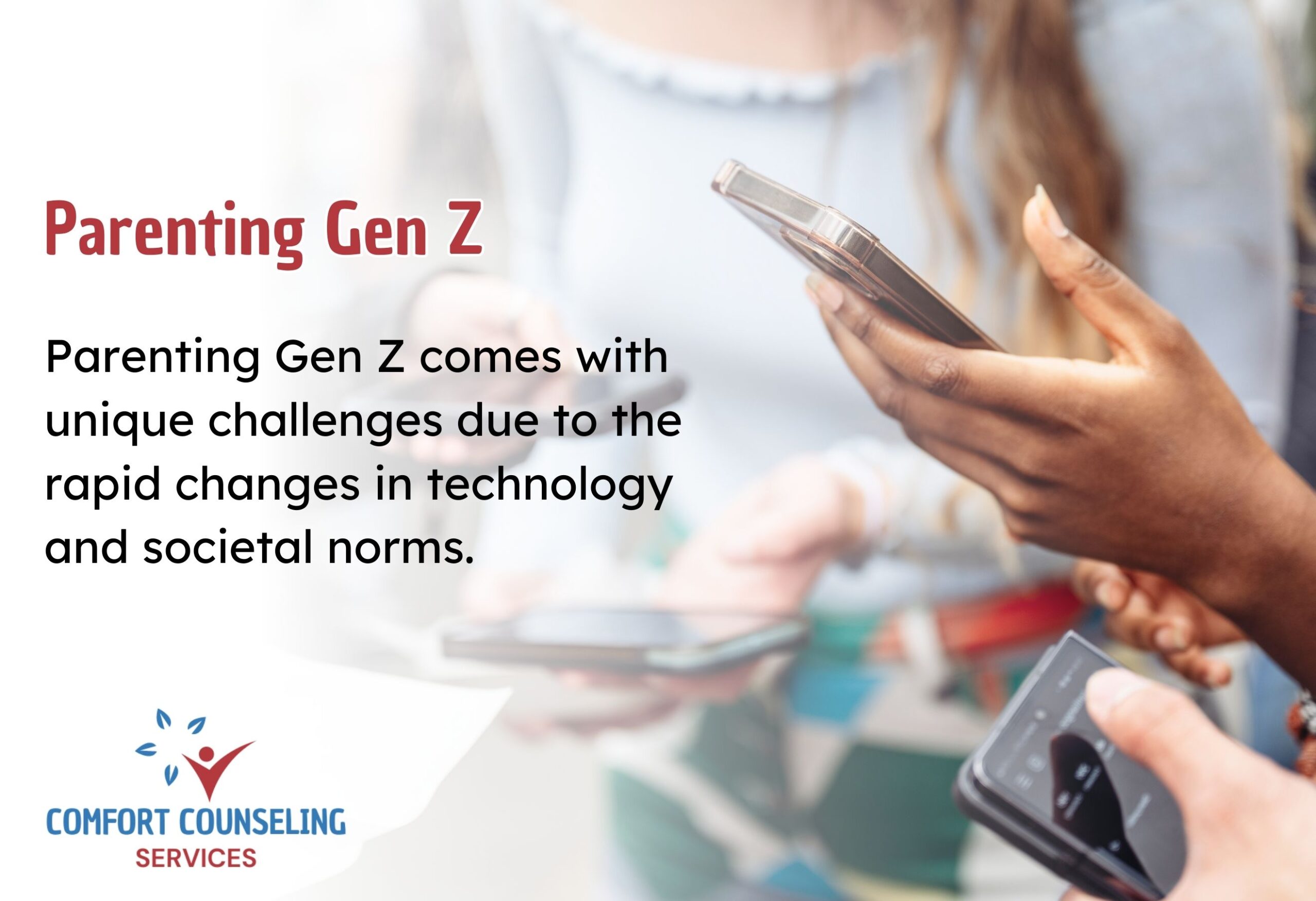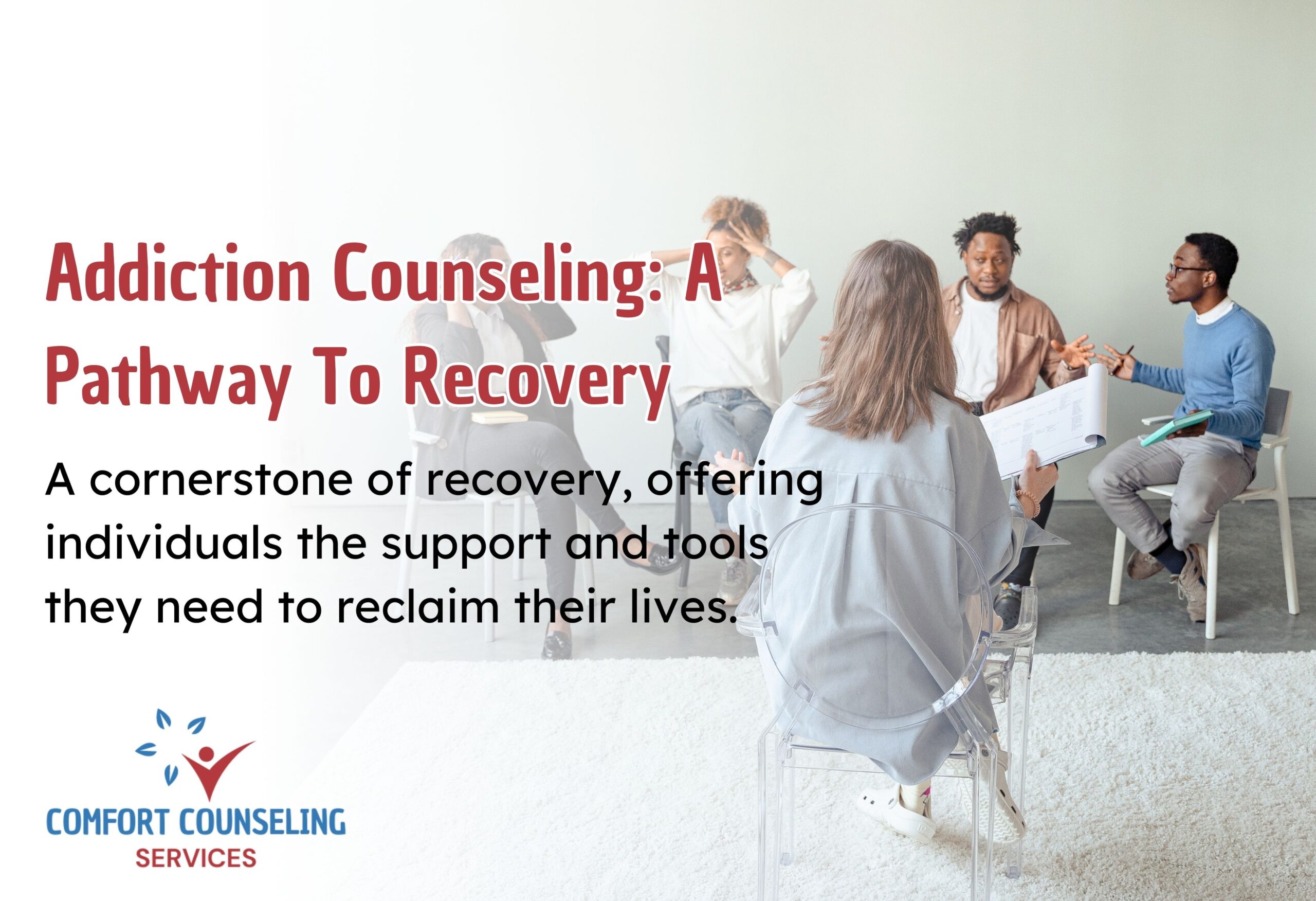Parenting has always been a challenging yet rewarding journey, but with each generation, new dynamics and challenges arise. Gen Z, those born roughly between 1997 and 2012, is growing up in a world vastly different from previous generations. At Comfort Counseling Services, we understand the unique challenges parents face today and are committed to providing support and guidance. This article explores the characteristics of Gen Z, the challenges of parenting in the digital age and effective strategies for nurturing and guiding this generation.
Understanding Gen Z
Gen Z has been shaped by rapid technological advancements, social media and a greater awareness of global issues. According to a Pew Research Center report, Gen Z is the most racially and ethnically diverse generation and is on track to be the most well-educated [Pew Research Center, 2020]. They are digital natives, having grown up with the internet, smartphones and social media, which significantly influence their communication, learning and social interactions.
Characteristics of Gen Z
- Tech-savvy: Gen Z is incredibly comfortable with technology and uses it for almost all aspects of their lives, from education, entertainment, socializing and shopping [Seemiller and Grace, 2016].
- Socially conscious: This generation is highly aware of social, environmental and political issues. They value inclusivity, diversity and social justice and are more likely to engage in activism{ Pew Research Center,2020].
- Mental Health awareness: Gen Z is more open about mental health issues and seeks help more readily than previous generations. They value mental well-being and are more likely to prioritize self-care [Twenge, 2017].
- Individualistic yet collaborative: While they value their individuality, Gen Z also works well in collaborative environments and appreciates teamwork[ Seemiller and Grace, 2016].
Challenges of parenting Gen Z:
Parenting Gen Z comes with unique challenges due to the rapid changes in technology and societal norms. Some of these challenges include:
- Screen time management: With the pervasive use of digital services, managing screen time is a significant challenge. Excessive screen time can impact sleep, physical health and mental well-being[ American Academy of Pediatrics, 2016].
- Navigating social media: Social media can be a double-edged sword, offering both connectivity and potential harm through cyberbullying, unrealistic comparisons and privacy concerns [O’Keefe and Clarke-Pearson, 2011].
- Mental Health concerns: The pressure to succeed academically and socially, coupled with constant exposure to social media, can contribute to anxiety, depression and other mental issues [ Twenge, 2017]
- Balancing independence and guidance: Gen Z values independence but still requires guidance and support from parents. Finding the right balance between giving freedom and setting boundaries is crucial.
Effective parenting strategies:
- Open communication: Encouraging open and honest communication is key to understanding your child’s needs and concerns. Create a safe space where your child feels comfortable sharing their thoughts and feelings without fear of judgment.
- Set healthy boundaries: Establish clear and consistent boundaries regarding screen time, social media use and other activities. The American Academy of Pediatrics recommends creating a family media plan that includes setting limits on screen time and encouraging other activities[ American Academy of Pediatrics, 2016].
- Promote mental health: Be proactive in discussing mental health and normalizing the conversation around it. Encourage healthy habits such as regular exercise, balanced nutrition, adequate sleep and mindfulness practices. Seek professional help if needed and utilize resources such as school counselors or mental health professionals.
- Model positive behaviour: Children learn by observing their parents. Model positive behaviours such as healthy screen habits, respectful communication and self-care. Show empathy, resilience and a growth mindset to help your child develop these traits.
- Encourage social awareness: Engage your child in discussions about current events and social issues. Encourage them to participate in community service or activism to foster a sense of responsibility and empathy towards others.
- Support education and career goals: Support your child’s academic and career aspirations by providing resources, guidance and encouragement. Recognize their strengths and interests and help them explore potential career paths.
Conclusion
Parenting Gen Z requires adaptability, empathy and an understanding of the unique challenges and opportunities this generation faces. At Comfort Counseling Services, we are here to support you in navigating these complexities. By fostering open communication, setting healthy boundaries, promoting mental health and modeling positive behaviour, you can guide your child towards a successful and fulfilling future.
References
- American Academy of Pediatrics [2016]. Media and Young Minds. Retrieved from AAP.
- O’Keefe, G.S., and Clarke- Pearson, K.[2011]. The impact of social media on children, adolescents and families. Pediatrics, 127[4], 800-804.
- Pew Research Center [2020]. On the cusp of adulthood and facing an uncertain future: What we know About Gen Z So Far. Retrieved from PEW Research.
- Seemiller,C., and Grace, M.[2016], Generation Z Goes to college. Jossey-Bass.
- Twenge, J.M. [2017].IGen: Why Today’s super-connected kids are growing up less rebellious, more tolerant, less happy and completely unprepared for adulthood-and what that means for the rest of us. Atria books.
- By focusing on these strategies, we hope to inspire and support you on your parenting journey. Join us at Comfort Counseling Services as we prioritize mental health and well-being for both you and your child.



